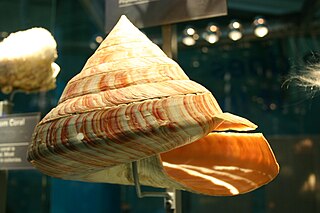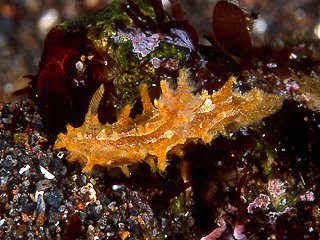
In zoology, a tentacle is a flexible, mobile, and elongated organ present in some species of animals, most of them invertebrates. In animal anatomy, tentacles usually occur in one or more pairs. Anatomically, the tentacles of animals work mainly like muscular hydrostats. Most forms of tentacles are used for grasping and feeding. Many are sensory organs, variously receptive to touch, vision, or to the smell or taste of particular foods or threats. Examples of such tentacles are the eyestalks of various kinds of snails. Some kinds of tentacles have both sensory and manipulatory functions.

Schizoglossa novoseelandica is a predatory species of air-breathing land slug or semi-slug, a terrestrial gastropod mollusc in the family Rhytididae. It is the type species of the genus Schizoglossa and is found only in New Zealand. The survival of this species is not threatened; it is not listed in the 2009 IUCN Red List nor is it in the 2005 New Zealand Threat Classification System lists.

Felimare picta is a species of colourful sea slug or dorid nudibranch, a marine gastropod mollusk in the family Chromodorididae. Atlantic Ocean species of Hypselodoris were all transferred to Felimare following a DNA phylogeny.

Nembrotha lineolata is a species of nudibranch, a sea slug, a marine gastropod mollusk in the family Polyceridae. It is found in shallow water in the Indo-Pacific. It was first described in 1905 by the Danish malacologist Rudolph Bergh. The type locality is Selayar Island, Indonesia.

Pleurotomariidae, common name the "slit snails", is a family of large marine gastropods in the superfamily Pleurotomarioidea of the subclass Vetigastropoda. This family is a very ancient lineage; there were numerous species in the geological past. The genus includes several hundred fossil forms, mostly Paleozoic. It is one of the oldest gastropod families, commencing in the Cambrian.

Pseudunela cornuta is a species of minute sea slug, an acochlidian, a shell-less marine and temporarily brackish gastropod mollusk in the family Pseudunelidae. Adults are about 3 mm long and live in the spaces between sand grains.

Tritonicula hamnerorum is a species of dendronotid nudibranch. It is a marine gastropod mollusc in the family Tritoniidae. A number of Caribbean species of Tritonia were moved to a new genus Tritonicula in 2020 as a result of an integrative taxonomic study of the family Tritoniidae.

Oxynoe viridis is a species of small sea snail or sea slug, a bubble snail, a marine gastropod mollusk in the family Oxynoidae.

Spergo glandiniformis is a species of sea snail, a marine gastropod mollusk in the family Raphitomidae.
Calliostoma marionae, common name Marion's top shell, is a species of sea snail, a marine gastropod mollusk in the family Calliostomatidae.

Coryphellina rubrolineata is a species of sea slug, an aeolid nudibranch, a marine heterobranch mollusc in the family Flabellinidae.
Plocamopherus lemur is a species of sea slug, a nudibranch, a shell-less marine gastropod mollusk in the family Polyceridae.
Plocamopherus maculapodium is a species of sea slug, a nudibranch, a shell-less marine gastropod mollusk in the family Polyceridae.
Plocamopherus pecoso is a species of sea slug, a nudibranch, a shell-less marine gastropod mollusk in the family Polyceridae.
Plocamopherus margaretae is a species of sea slug, a nudibranch, a shell-less marine gastropod mollusk in the family Polyceridae.
Kaloplocamus dokte is a species of sea slug, a nudibranch, a shell-less marine gastropod mollusc in the family Polyceridae.

Kaloplocamus peludo is a species of sea slug, a nudibranch, a shell-less marine gastropod mollusc in the family Polyceridae.
Pleurobranchus varians is a species of sea slug, a sidegill slug, a marine gastropod mollusc in the family Pleurobranchidae.
Kankelibranchus incognitus is a species of sea slug, a nudibranch, a shell-less marine gastropod mollusc in the family Polyceridae.
Kankelibranchus alhenae is a species of sea slug, a nudibranch, a shell-less marine gastropod mollusc in the family Polyceridae.










